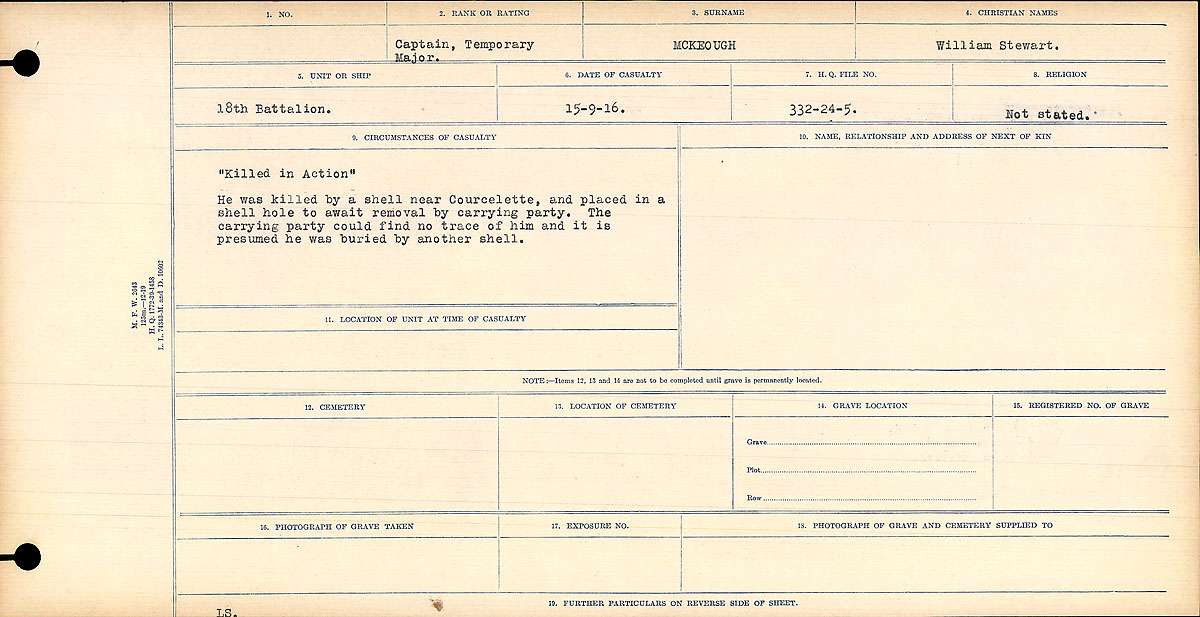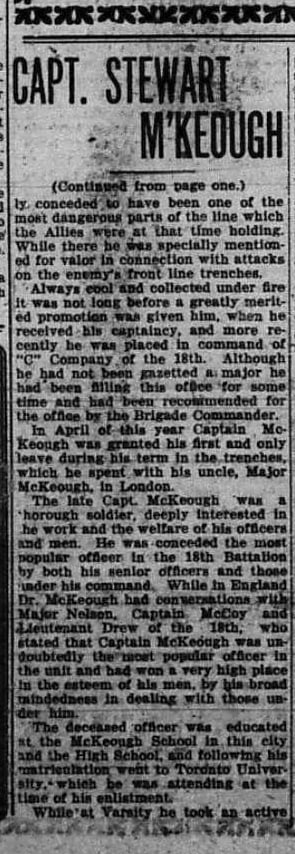Son of W. E. and M. A. McKeough, of Chatham, Ontario.
Biography courtesy of Chatham This Week
Letter written November 1, 1915
Excerpt: “I was fortunate one night in locating a grand Louis quatorge canopied feather bed, while the following night caught a good four hours’ sleep on a bundle of straw in a manger with a noisy young calf, having to pull out at 2:30 a.m. in the pouring rain to go into the trenches. Such is this life.”
“Son of W. E. and M. A. McKeough, of 371, King St. West, Chatham, Ontario. b.Chatham; ed. McKeough P.S. and Chatham C.I.; University College 1910-1912, Medicine 1912-1914; Delta Kappa Epsilon; Manager,Third hockey team; Medical Athletic executive; Track team 1912-1914, First colours and captain 1914; Intercollegiate high jump record; Athletic directorate 1914-15; 24th Regt.,Lieut. In the fall of 1914 he was appointed to the 18th Battalion and went overseas in April,1915. Reaching France in September he served through the autumn and winter on the front south of Ypres. He was promoted captain in January,1916, and Major in July. At St.Eloi he distinguished himself by his bravery in bringing in the wounded after the unsuccessful attack on Crater 3. On the morning of the battle of Courcelette his battalion, despite heavy casualties, took part in the capture of the Sugar Refinery, and he was killed in action as he reached the German parapet when leading his company in the attack.”


“WILLIAM STEWART McKEOUGH Sept. 2, 1893-Sept. 15, 1916
Major, Eighteenth Battalion
Son of W.E. McKeough; b. Chatham; ed. McKeough P.S. and Chatham C.I.; University College 1910-12, Medicine 1912-14; Delta Kappa Epsilon; Manager Third Hockey team; Medical Athletic executive; Track team 1912-14, First colours and Captain 1914; Intercollegiate high jump record; Athletic directorate 1914-15; 24th Regt., Lieut.In the fall of 1914 he was appointed to the 18th Battalion, and went overseas in April 1915. Reaching France in September he served through the autumn and winter on the front south of Ypres. He was promoted Captain in January 1916 and Major in July. At St. Eloi he distinguished himself by his bravery in bringing in the wounded after the unsuccessful attack on Crater 3. On the morning of the battle of Courcelette his battalion, despite heavy casualties, took part in the capture of the Sugar Refinery, and he was killed in action as he reached the German parapet when leading his company in the attack.”
In a letter also published in the “London Free Press” , November 1, 1915 he wrote:
“We have been in the game over here almost a month and having lost little time after our arrival in France in gaining experience or instruction. We have been kept busy. You may have heard by this time of our narrow escape in crossing this channel, when our transport was rammed amidships by a torpedo boat steaming 22 knots per hour and for several long and dreary hours we were truly a shipwrecked crew in distress, on a cold black night and a choppy sea.
The next few wet days were occupied in heavy marches over cobblestone roads across France. By the end of the week we had taken over our trenches and had received our baptism of fire in good order. We have since then been in and out or just behind the line in, support or reserve.
The Canadians to date have not been utilized as a driving force, but, of course, have had our part to play in other ways, connecting with the move on the 25th of last month.(3) On that day we surely realized that we were in the midst of a terrific bombardment by our artillery, which, however, was carried on more particularly and incessantly some distance south of us. Last week, after enjoying a few days and a bath, etc, two miles behind, we turned over our line, which was composed of exceptionally good trenches, and moved a few miles north, taking over a new frontage. Our former trenches were splendid, but these I believe are in a class by themselves – a hot corner where the wind and water of Flanders, large quantities of which we have already encountered, are at their best.
For the past two days we have been occupying dugouts just a year old, which, having been hurriedly and very poorly constructed, are now rotting and falling to pieces. Damp, musty and filthy, with the grass and weeds and moss sprouting in patches over the sand bagged walls, we have been kept busy cleaning up and making them habitable, as well as building new quarters.
Altogether this is quite a life out here, everyone making the best of matters and all getting along in good style. I am enclosing you clipping from one of the London papers, which gives a rather elaborate account of the billeting system in France and Belgium. Well, we have put up in every kind of quarters, in fields, in barns, in sheds and stables, in tents, in live beds, on marble floors and in dugouts, etc.
I was fortunate one night in locating a grand Louis quatorge canopied feather bed, while the following night caught a good four hours’ sleep on a bundle of straw in a manger with a noisy young calf, having to pull out at 2:30 a.m. in the pouring rain to go into the trenches. Such is this life.”









